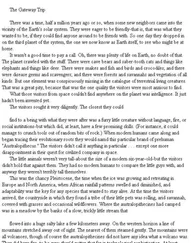Tones that came out of the bottom of a cave: “Da, gospodin.”
“And you’ll tell me anything I want to know about me?”
“Da, gospodin.”
“In English, damn it!”
“Yes.”
“Or about your other clients?”
“Yes.”
Um, that sounds like fun. “And just who are these lucky other clients, dear Sigfrid? Run down the list.” I can hear my own prurience leaking out of my voice.
“Monday nine hundred,” he begins obligingly, “Yan Ilievsky. Ten hundred, Francois Malit. Eleven hundred, Julie Loudon Martin. Twelve—”
“Her,” I say. “Tell me about her.”
“Julie Loudon Martin is a referral from Kings County General, where she was an outpatient after six months of treatment with aversion therapy and immune-response activators for alcoholism. She has a history of two apparent suicide attempts following postpartum depression fifty-three years ago. She has been in therapy with me for—”
“Wait a minute,” I say, having added the probable age of childbearing to fifty-three years. “I’m not so sure I’m interested in Julie. Can you give me an idea of what she looks like?”
“I can display holoviews, Rob.”
“So do it.” At once there is a quick subliminal flash, and a blur of color, and then I see this tiny black lady lying on a mat — my mat! — in a corner of the room. She is talking slowly and without much interest to no one perceptible. I cannot hear what she is saying, but then I don’t much want to.
“Go on,” I say, “and when you name your patients, show me what they look like.”
“Twelve hundred, Lorne Schofield.” Old, old man with arthritic fingers bent into claws, holding his head. “Thirteen hundred, Frances Astritt.” Young girl, not even pubescent. “Fourteen hundred—”
I let him go on for a while, all through Monday and halfway through Tuesday. I had not realized he kept such long hours, but then, of course, being a machine he doesn’t really get tired. One or two of the patients look interesting, but there is no one I know, or no one that looks more worth knowing than Yvette, Donna, S. Ya. or about a dozen others. “You can stop that now,” I say, and think for a minute.
This isn’t really as much fun as I thought it was going to be. Plus my time is running out.
“I guess I can play this game any old time,” I say. “Right now let’s talk about me.”
“What would you like me to display, Rob?”
“What you usually keep from me. Diagnosis. Prognosis. General comments on my case. What kind of a guy you think I am, really.”
“The subject Robinette Stetley Broadhead,” he says at once, is a forty five year old male, well off financially, who persues an active life-style. His reason for seeking psychiatric help is given as depression and disorientation. He has pronounced guilt feelings and exhibits selective aphasia on the conscious level about several episodes that recur as dream symbols. His sexual drive is relatively low. His relationships with women are generally unsatisfactory, although his psychosexual orientation is predominantly heterosexual in the eightieth percentile…”
“The hell you say—” I begin, on a delayed reaction to low sexual drive and unsatisfactory relationships. But I don’t really feel like arguing with him, and anyway he says voluntarily at that point:
“I must inform you, Rob, that your time is nearly up. You should go to the recovery room now.”
“Crap! What have I got to recover from?” But his point is well taken. “All right,” I say, “go back to normal. Cancel the command — is that all I have to say? Is it canceled?”
“Yes, Robbie.”
“You’re doing it again!” I yell. “Make up your fucking mind what you’re going to call me!”
“I address you by the term appropriate to your state of mind, or to the state of mind I wish to induce in you, Robbie.”
“And now you want me to be a baby? — No, never mind that. Listen,” I say, getting up, “do you remember all our conversation while I had you commanded to display?”
“Certainly I do, Robbie.” And then he adds on his own, a full, surprising ten or twenty seconds after my time is up, “Are you satisfied, Robbie?”
“What?”
“Have you established to your own satisfaction that I am only a machine? That you can control me at any time?”
I stop short. “Is that what I’m doing?” I demand, surprised. And then, “All right, I guess so. You’re a machine, Sigfrid. I can control you.”
And he says after me as I leave, “We always knew that, really, didn’t we? The real thing you fear — the place where you feel control is needed — isn’t that in you?”
When you spend weeks on end close to another person, so close that you know every hiccough, every smell and every scratch on the skin, you either come out of it hating each other or so deep in each other’s gut that you can’t find a way out. Klara and I were both. Our little love affair had turned into a Siamese-twin relationship. There wasn’t any romance in it. There wasn’t room enough between us for romance to occur. And yet I knew every inch of Klara, every pore, and every thought, far better than I’d known my own mother. And in the same way: from the womb out. I was surrounded by Klara.
And, like a Klein-bottle yin and yang, she was surrounded by me, too; we each defined the other’s universe, and there were times when I (and, I am sure, she) was desperate to break out and breathe free air again.
The first day we got back, filthy and exhausted, we automatically headed for Klara’s place. That was where the private bath was, there was plenty of room, it was all ready for us and we fell into bed together like old marrieds after a week of backpacking. Only we weren’t old marrieds. I had no claim on her. At breakfast the next morning (Earth-born Canadian bacon and eggs, scandalously expensive, fresh pineapple, cereal with real cream, cappuccino), Klara made sure to remind me of that fact by ostentatiously paying for it on her own credit. I exhibited the Pavlovian reflex she wanted. I said, “You don’t have to do that. I know you have more money than I do.”
“And you wish you knew how much,” she said, smiling sweetly. Actually I did know. Shicky had told me. She had seven hundred thousand dollars and change in her account. Enough to go back to Venus and live the rest of her life there in reasonable security if she wanted to, although why anyone would want to live on Venus in the first place I can’t say. Maybe that was why she stayed on Gateway when she didn’t have to. One tunnel is much like another. “You really ought to let yourself be born,” I said, finishing out the thought aloud. “You can’t stay in the womb forever.”
She was surprised but game. “Rob, dear,” she said, fishing a cigarette out of my pocket and allowing me to light it, “you really ought to let your poor mother be dead. It’s just so much trouble for me, trying to remember to keep rejecting you so you can court her through me.”
I perceived that we were talking at cross-purposes but, on the other hand, I perceived that we really weren’t. The actual agenda was not to communicate but to draw blood. “Klara,” I said kindly, “you know that I love you. It worries me that you’ve reached forty without, really, ever having had a good, long-lasting relationship with a man.”
She giggled. “Honey,” she said, “I’ve been meaning to talk to you about that. That nose.” She made a face. “Last night in bed, tired as I was, I thought I might upchuck until you turned the other way. Maybe if you went down to the hospital they could unpack it—”
Well, I could even smell it myself. I don’t know what it is about stale surgical packing, but it is pretty hard to take. So I promised I would do that and then, to punish her, I didn’t finish the hundred-dollar order of fresh pineapple and so, to punish me, she irritably began shifting my belongings around in her cupboards to make room for the contents of her knapsack. So naturally I had to say, “Don’t do that, dear. Much as I love you, I think I’d better move back to my own room for a while.”
Читать дальше












